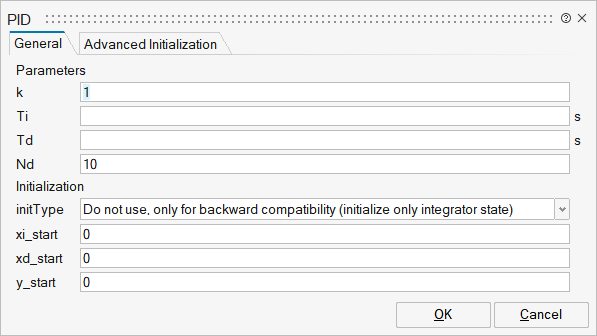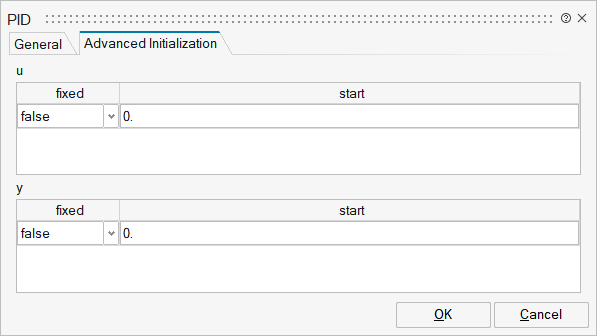PID
PID-controller in additive description form
![]()
Library
Blocks/Continuous
Description
This is the text-book version of a PID-controller. For a more practically useful PID-controller, use block LimPID.
The PID block can be initialized in different ways controlled by parameter initType. The possible values of initType are defined in Modelica.Blocks.Types.InitPID. This type is identical to Types.Init, with the only exception that the additional option DoNotUse_InitialIntegratorState is added for backward compatibility reasons (= integrator is initialized with InitialState whereas differential part is initialized with NoInit which was the initialization in version 2.2 of the Modelica standard library).
Based on the setting of initType, the integrator (I) and derivative (D) blocks inside the PID controller are initialized according to the following table:
| initType | I.initType | D.initType |
| NoInit | NoInit | NoInit |
| SteadyState | SteadyState | SteadyState |
| InitialState | InitialState | InitialState |
| InitialOutput and initial equation: y = y_start |
NoInit | SteadyState |
| DoNotUse_InitialIntegratorState | InitialState | NoInit |
In many cases, the most useful initial condition is SteadyState because initial transients are then no longer present. If initType = InitPID.SteadyState, then in some cases difficulties might occur. The reason is the equation of the integrator:
der(y) = k*u;
The steady state equation "der(x)=0" leads to the condition that the input u to the integrator is zero. If the input u is already (directly or indirectly) defined by another initial condition, then the initialization problem is singular (has none or infinitely many solutions). This situation occurs often for mechanical systems, where, e.g., u = desiredSpeed - measuredSpeed and since speed is both a state and a derivative, it is natural to initialize it with zero. As sketched this is, however, not possible. The solution is to not initialize u or the variable that is used to compute u by an algebraic equation.
Parameters

| Name | Label | Description | Data Type | Valid Values |
|---|---|---|---|---|
mo_k | k | Gain | Scalar | |
mo_Ti | Ti | Time Constant of Integrator | Scalar | |
mo_Td | Td | Time Constant of Derivative block | Scalar | |
mo_Nd | Nd | The higher Nd, the more ideal the derivative block | Scalar | |
mo_initType | initType | Type of initialization (1: no init, 2: steady state, 3: initial state, 4: initial output) | Structure | |
mo_initType/choice1 | No initialization (start values are used as guess values with fixed=false) | Number | 0 | |
mo_initType/choice2 | Steady state initialization (derivatives of states are zero) | Number | 0 | |
mo_initType/choice3 | Initialization with initial states | Number | 0 | |
mo_initType/choice4 | Initialization with initial outputs (and steady state of the states if possible) | Number | 0 | |
mo_initType/choice5 | Do not use, only for backward compatibility (initialize only integrator state) | Number | 0 | |
mo_xi_start | xi_start | Initial or guess value for integrator output (= integrator state) | Scalar | |
mo_xd_start | xd_start | Initial or guess value for state of derivative block | Scalar | |
mo_y_start | y_start | Initial value of output | Scalar | |
mo_unitTime | unitTime | Scalar |

| Name | Label | Description | Data Type | Valid Values |
|---|---|---|---|---|
mo_u | u | u | Structure | |
mo_u/fixed | fixed | Cell of scalars | true | |
mo_u/start | start | Cell of scalars | ||
mo_y | y | y | Structure | |
mo_y/fixed | fixed | Cell of scalars | true | |
mo_y/start | start | Cell of scalars |
Ports
| Name | Type | Description | IO Type | Number |
|---|---|---|---|---|
u | implicit | Connector of Real input signal | input | 1 |
y | implicit | Connector of Real output signal | output | 1 |